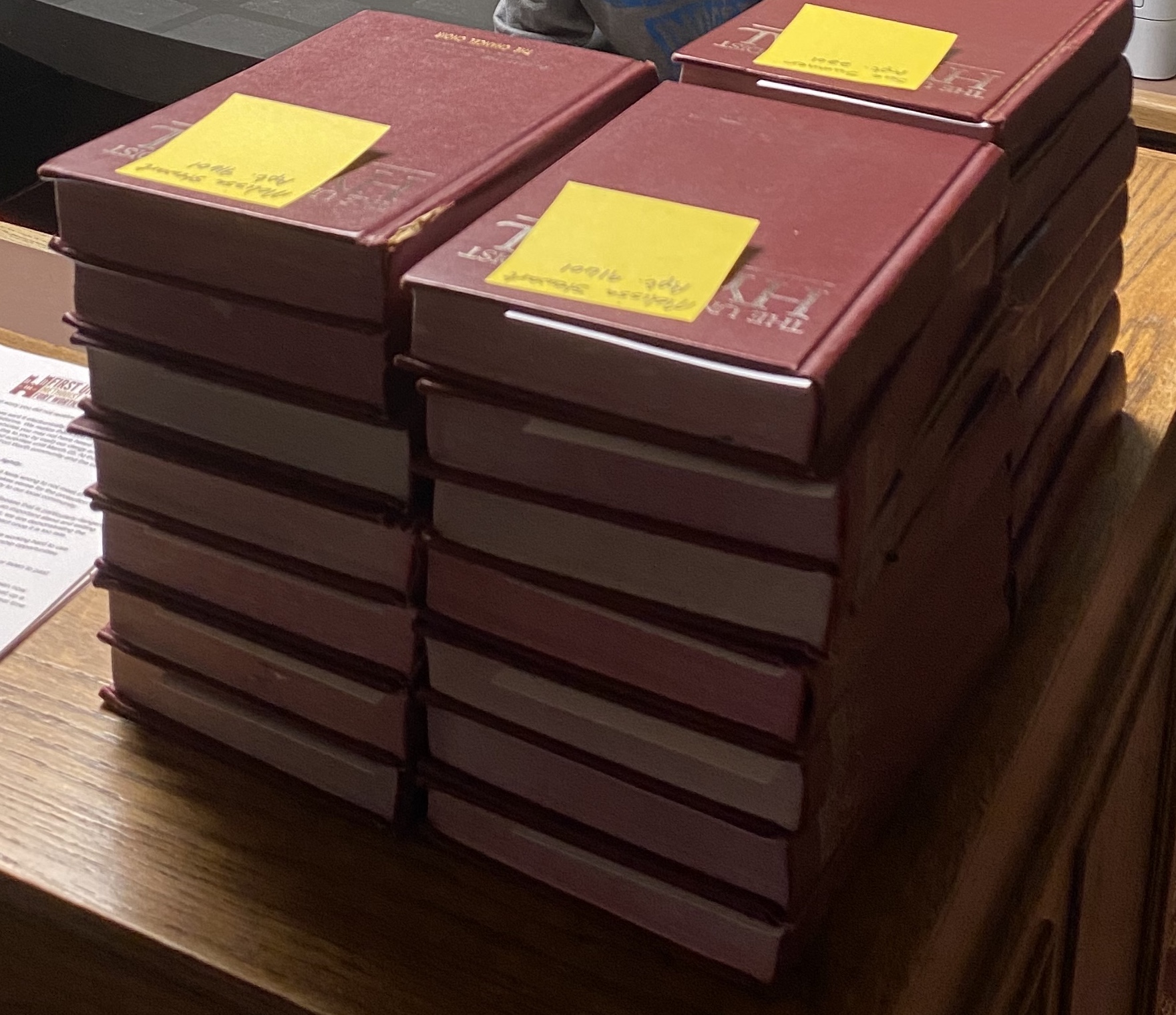Morning and night and at all points in between, your church is here for you — and with you — in prayer. Choose from a variety of options and styles of prayer during this uncertain time with options including making a prayer request any time of the day or night, or join our pastors in any or all of the three prayer options:
Daily Devotional with Rev. Lance Marshall
Every morning Rev. Lance Marshall hosts a prayer group and daily devotional from 9:00-9:15 via Zoom, Facebook Live, and Instagram Live. Learn more at https://fumcfw.org/event/107515/2020-03-26/
Evening Prayer Room with Dr. Zhenya Gurina-Rodriguez
To actively respond — and to invite others to do the same — to the prayer requests that come in throughout the day — along with your personal prayer requests you bring to the room each evening, Zhenya will host a special come and go (or come and stay!) Zoom Prayer Room 9:00 – 9:30 pm each evening. This will be a sacred space to which all are invited and welcome to bring any prayer concerns as well as to join Zhenya in prayer for all who have requested prayers that day.
“During this season of social distancing we do not get to see each other and share our thoughts, needs, concerns as we would normally do so that we pray for each other,” Zhenya observes. “During crisis we feel even more need to be in the presence of God and to pray for one another. So I realized that I need to be more intentional about it and create time and space dedicated for prayers — and that others may be wanting that, too.”
Zhenya says that upon entering her Nightly Prayer Room via Zoom you can expect to start with a Psalm or other Scripture or a written prayer, and then whoever is gathered there will continue into a time of prayer. “I will pray out loud, and people who join me can pray in their hearts — or they can mute their microphones and pray out loud along with me,” Zhenya explains. She adds that she will also go through the first names of people who have submitted their prayer requests on that day, and she will then invite others to say out loud the names of people they are praying for. “In the end we will finish with the Lord’s Prayer, all together,” she says.
During this season many of us are need of God’s Love, Peace and Grace, and there are a lot of reasons to feel this way. Zhenya says that in developing this practice of nightly prayer with intention we can learn to bring all the weight of the stress, anxiety, and other emotions we are feeling to God at the end of the our day, and in so doing we invite God to join us in our brokenness and need. “We do not know how long this season will last,” she adds, “but I firmly believe that regular intentional prayer will help us remain strong and encouraged in the midst of pandemic and economic crisis.”
Acknowledging that because we do not know all the answers, we cannot solve all the problems, Zhenya says that as we pray, we discover how God is present and active in our midst sharing all the pain and weight that we are carrying. “In the last couple of weeks, I have reminded myself often of Matthew 6:34,” Zhenya says, ” ‘Stop worrying about tomorrow, because tomorrow will worry about itself. Each day has enough trouble of its own.’ The only way I can stop worrying is to pray,” she adds. “Nothing else works for me.”
Centering Prayer with Dr. Len Delony
Thomas Merton, writer, theologian, and scholar of comparative religion, described contemplative prayer as prayer “centered entirely on the presence of God.” With practice, this ancient style of prayer is said by many to be helpful in becoming more present and open to God. People who love Centering Prayer will be quick to tell you that while it does not replace other prayer, it does beckon a calming silence and a deeper connection to God.
Dr. Len Delony, FUMCFW Director of Spiritual Formation, explains that in the Wesleyan Quadrilateral we lift up Scripture, Tradition, Reason, and Experience as the four important aspects of growing in faith. “I’ve said for years that we have barely scratched the surface of “Experience,” he adds. “Centering Prayer is one of the best ways to be available to experience God and grow in grace.”
Len says that his first awakening to what Centering Prayer is about happened long before he had heard of it. “In the spring of 1971, I had just moved back home after my first four months of treatment at St. Jude’s for Hodgkin’s Lymphoma,” he relates. “I had gone from 115 pounds down to 75 pounds, and I was too weak to go to school.”
Len says that one day he decided to walk around in their back yard and then to lie in the warm grass and take in the sounds, sights, and smells of Spring with all of his senses. “Something inside me woke up,” he recalls. “And I realized I was part of something much bigger. It took me a long time to live into the many questions that came from being a cancer patient with relapse and other complications over six years. But the deeper part of healing, the unfolding gift of having cancer, and the power of the simple Presence of God stayed with me.”
Len says that while this experience stuck with him it wasn’t until twenty years later, in 1991, on a week-long retreat called “Rediscovering a Forgotten Tradition: The Contemplative Way” at the Fetzer Institute in Kalamazoo that he learned the specific practice of Centering Prayer. “Almost immediately,” he relates, “I realized that Centering Prayer helped me become aware of God’s Presence at a depth very similar to what I had experienced way back in 1971.”
And now, he says, here we are in one of the most vulnerable times in our lives, and he feels confident that this simple way of resting in the shade of God’s mercy is one of the most powerful things we can do. “I’m very hopeful that a growing number of people are being forced to slow down and pay attention to their deepest longings,” he adds. ‘Centering Prayer is a powerful way for us all to discover that bridge of healing that connects us with our deepest way of belonging together as the Body of Christ.”
Len, who earned his Master of Divinity at Iliff School of Theology, a Master of Social Work at the University of Chicago, and a Doctor of Ministry at Chicago Theological Seminary, serves our church and other local groups and individuals as a Spiritual Director, those who are interested in all kinds of spiritual formation practices, including the labyrinth prayer walk, which he hosts in Wesley Hall at several key times each year.
Len says he often recommends, as a spiritual director, that people allow nature to be one of their teachers. “Be present to God’s simple Presence in creation in any given moment,” he elaborates. “Our anxious awareness can settle into the heart and soul of what matters most. Without moving at all, we can awaken to the hidden wholeness beneath our worries, and ‘the peace the passes all understanding.’”
After leading FUMCFW Centering Prayer groups on Wednesday mornings off and on since the early 2000s, Len says he then began encouraging people to start groups in their homes — or in natural surroundings near their home. Mitzi Ellington, Judy Tutt, and Rev. Kay Johnson started these weekly groups outside the church that have been going strong for many years.
In times of brokenness and vulnerability, Len says that the practice of Centering Prayer anchors him in God’s presence and offers a kind of comfort and peace he has not been able to find in other ways. “Give it a try,” he encourages. “And feel free to contact me with any questions that arise as you find your way into this ancient prayer practice.”
Centering prayer via Zoom, led by Len will be available on Tuesdays and Fridays, 7:00 – 8:30 am in Zoom Room 2. To join, be sure you have the Zoom app loaded onto the device you will be using, and then click on the link https://zoom.us/j/8173367272.
How do you do Centering Prayer?
- Choose a sacred word as the symbol of your intention to consent to God’s presence and action within.
- Sitting comfortably and with eyes closed, settle briefly and silently introduce the sacred word as the symbol of your consent to God’s presence and action within.
- When engaged with your thoughts — body sensations, feelings, images, and reflections — return ever-so-gently to the sacred word.
- At the end of the prayer period, remain in silence with eyes closed for a couple of minutes.

